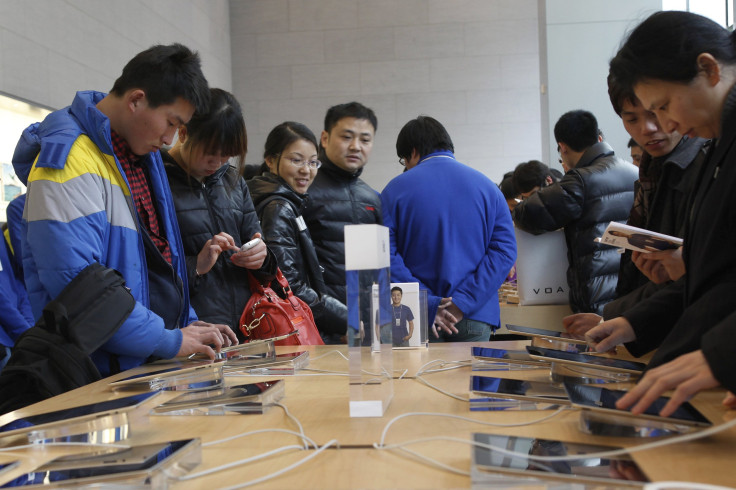Apple, Volkswagen Are The Latest Foreign Companies To Face Allegations Of Consumer Rights Violations In China From Country's State Owned CCTV

China is most often thought of as being a country of producers, but with its economic growth there is emerging a middle class that hungers for Western fast food, smartphones and foreign-brand automobiles. Growing right along with this burgeoning group of buyers is more attention to consumer rights by the country’s strictly controlled media.
Every year, China Central Television (CCTV) hosts “3.15,” a show commemorating World Consumer Rights Day that takes place annually on March 15. Resembling more an elaborate awards ceremony than an episode of “60 Minutes,” the program features a dressed up audience and an emcee that presents a series of broadcast exposés on alleged misconduct from companies doing business in China. (The Mandarin-language index for this year’s segments can be seen here.)
This year CCTV put some major global corporate players under its scrutiny spotlight, including Apple Inc. (Nasdaq:AAPL) and Volkswagen AG (ETR:VOW).
The report, broadcast nationwide on Friday evening, said that the Cupertino, Calif.-based tech giant was giving Chinese consumers of its popular iPhone short shrift by not offering the same tech support services in China that it provides to customers in other countries.
For example, the report claims that when Apple repairs iPhones, the company tends to provide the gadget’s new back cover free of charge, but that in China it charges about $93 for the replacement part.
For its part, Apple quickly responded with a boilerplate comment about “striving to exceed our customers' expectations.” It didn’t need to elaborate, because the allegations of poor customer service were superseded by the reaction to the news piece rather than its subject.
Sina Weibo, the country’s answer to Twitter that has become the go-to source for gauging public sentiment in China, lit up with responses to the report, but mostly revolving around whether CCTV was trying to influence public sentiment to its investigative reporting.
About six minutes after the Apple segment aired on the program, popular Taiwanese-American actor Peter Ho posted a response critical of Apple, according to a translation by the South China Morning Post, which said CCTV had “fallen victims to one of its own shows.”
The following message appeared on Ho’s Weibo page: “Apple plays so many tricks with their customer service? I feel hurt as an Apple fan. Have you done right by [Steve] Jobs? Have you done right by boys who sell their kidneys [to buy iphones] . . . this is an example of big-name shops bullying customers.”
The comment elicited accusations that Ho was on the dole to make Apple look bad to his 5.5 million Weibo followers, especially because his post ended with the line “To publish around 8.20pm,” suggesting the post was pre-written and held offline until the Apple segment aired. The post critical of Apple was taken down shortly after and replaced with a post by Ho denying he had written the message, claiming his account had been hacked.
Regardless of who write or posted the message, Ho received a flood of critical comments for what is believed by many to have been a plot by CCTV (with Ho’s consent) to make itself look like a crusader for consumer rights by using prominent Weibo subscribers to affect public opinion.
“We wonder how much CCTV paid him to do this,” said Beijing Cream’s Anothony Tao. “CCTV apparently has begun its own viral campaign to make it seem like the public is on their side. But netizens have sniffed it out.”
CCTV might have underestimated the public’s feelings about its journalistic standards, but its segment criticizing Volkswagen for an ongoing problem the company has with its direct shift gearbox (seen here in Mandarin) didn’t attract nearly as much controversy.
Unlike Apple, Volkswagen acknowledged the complaints and said it would voluntarily recall an undisclosed number of the vehicles. Volkswagen Group China sold 2.81 million units in China last year and is the country’s second largest foreign carmaker. It manufactures vehicles for the Chinese marker under two joint ventures, one with SAIC Motor Corp. Ltd. (SHA:600104) and the other with China FAW Group Corporation.
The CCTV annual series of consumer rights reports have targeted major foreign companies in the past, according to Reuters, including McDonald's Corporation (NYSE:MCD), Wal-Mart Stores, Inc., (NYSE:WMT) and Carrefour SA (EPA:CA). A separate CCTV report in December questioning the quality of chicken used by Yum! Brands, Inc. (NYSE:YUM) – which owns KFC, Pizza Hut and Taco Bell and which has a major presence in China – sent the company’s China same store sales down 20 percent in January and February.
China’s growing middle class, defined by economist Helen Wang in a report last year on CNNMoney as anyone in the country earning between $10,000 and $60,000 a year, is estimated to be larger than the population of the United States. Because of this, demand for international retail brands is booming, as is the attention the media and government is paying to consumer affairs.
Whether this attention the government and its state-controlled media is giving to the subject is actually helping to protect public safety and consumer rights is one that isn’t likely to be definitively answered by a media kept on a short government leash.
© Copyright IBTimes 2024. All rights reserved.












